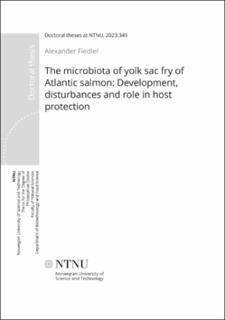| dc.contributor.advisor | Bakke, Ingrid | |
| dc.contributor.advisor | Vadstein, Olav | |
| dc.contributor.advisor | Almaas, Eivind | |
| dc.contributor.author | Fiedler, Alexander Willi | |
| dc.date.accessioned | 2023-10-26T12:37:37Z | |
| dc.date.available | 2023-10-26T12:37:37Z | |
| dc.date.issued | 2023 | |
| dc.identifier.isbn | 978-82-326-7397-1 | |
| dc.identifier.issn | 2703-8084 | |
| dc.identifier.uri | https://hdl.handle.net/11250/3098957 | |
| dc.description.abstract | Norsk sammendrag
Bakterier finnes overalt rundt oss og på hver plante, menneske eller overflate. Disse bakteriene kaller vi for «mikrobiomen», før eksempel kaller vi bakteriene som bor i tarmen vår vår «tarm mikrobiom».
Denne avhandlingen jobbet med mikrobiomen av nyklekt laks og undersøkte hvor denne mikrobiomen kommer fra, hva som påvirker den og hvordan den kan beskytte fisken mot sykdom. For å undersøke dette ble det brukt bakteriefrie fisk, som er fisk der alle bakteriene ble fjernet på labben. Ved bruk av disse kunne vi vise at mikrobiomen beskyttet fiskene mot en sykdomsfremkallende patogen og er dermed svært viktig for fiskens velferd. Videre ble det undersøkt hvordan man kan beskytte denne verdifulle mikrobiomen mot forstyrrelser, som før eksempel bruk av antibiotika. Antibiotika skader de fleste bakterier og dermed også de «gode» bakteriene som er en naturlig del av mikrobiomen. Det ble derfor undersøkt hvordan man kan finne alternativer for antibiotika som ikke er skadelig for mikrobiomen. En av disse alternativene er (bacterio)fag terapi. Fager er virus som bare dreper bakterier, men er ufarlig for mennesker. Disse fagene er veldig spesifikke og infiserer dermed bare patogene bakterier, som er de som gjør fiskene syke. I denne PhDen ble det faktisk vist at fag terapi funker like godt som antibiotika terapi for å beskytte fiskene, men er ikke skadelig for mikrobiomen.
Denne avhandlingen viser dermed at mikrobiomen til laks er svært viktig for å beskytte fisken mot sykdom og at vi burde bruke fag terapi når fiskene blir syke istedenfor klassisk antibiotika terapi. Disse funnene ble gjort for laks, men er også høgst relevant for menneskene, siden også vi har en mikrobiom som beskytter oss mot sykdom. Også vi burde begynne å bruke mindre antibiotika som skader den verdifulle mikrobiomen vår og burde tenke på alternativer, som fag terapi. | en_US |
| dc.description.abstract | English summary
Bacteria are everywhere and colonize every plant, animal, or surface. We call these bacterial communities the “microbiome”. For example, we refer to all bacteria that live in our gut as the “gut microbiome”.
In this PhD thesis, the microbiome of freshly hatched Atlantic salmon was in the centre of attention. It was explored how this microbiome is assembled, how it can be influenced and how it protects the fish against bacterial infections. By using germ-free fish, which are fish from which the microbiome was experimentally removed, it was shown that the microbiome protected the fish against a deadly fish pathogen and thus provides a valuable service to its animal host. Another part of this work was then focusing on how this valuable microbiome can be protected against disturbances, such as usage of antibiotics. Antibiotics non-specifically kill most bacteria, and thus damage the microbiome. Therefore, a treatment method was explored that is expected to not damage the microbiota, which is usage of (bacterio)phages. Phages are viruses that only infect bacteria and are usually very specific, targeting only the pathogenic bacteria and leaving the rest of the microbiome unharmed. In this thesis, this was shown to be the case in the Atlantic salmon, where usage of phages cured the fish from a lethal bacterial disease while the microbiome was left unharmed.
This PhD thesis therefore showed that the microbiome of Atlantic salmon serves a valuable role in protecting the fish against diseases and that treatment options that do not harm the microbiome, such as usage of phages, need to get more attention. Theses results that were gained in the model organism Atlantic salmon can be transferred to humans and other animals and are therefore highly relevant in a holistic medical approach towards healthy host-microbiome interactions. | en_US |
| dc.language.iso | eng | en_US |
| dc.publisher | NTNU | en_US |
| dc.relation.ispartofseries | Doctoral theses at NTNU;2023:349 | |
| dc.relation.haspart | Paper 1: Fiedler, Alexander Willi; Drågen, Martha K. R.; Degré Lorentsen, Eirik; Vadstein, Olav; Bakke, Ingrid. The stability and composition of the gut and skin microbiota of Atlantic salmon throughout the yolk sac stage. Frontiers in Microbiology 2023 ;Volum 14. s. - This is an open-access article distributed under the terms of the Creative Commons Attribution License (CC BY). | en_US |
| dc.relation.haspart | Paper 2: Gundersen, Madeleine S.; Fiedler, Alexander Willi; Bakke, Ingrid; Vadstein, Olav. The impact of phage treatment on bacterial community structure is negligible compared to antibiotics. This paper is under review for publication and is therefore not included. | en_US |
| dc.relation.haspart | Paper 3: Fiedler, Alexander Willi; Gundersen, Madeleine S.; Vo, Toan P.; Almaas, Eivind; Vadstein, Olav; Bakke, Ingrid. Phage therapy minimally affects the water microbiota in an Atlantic salmon (Salmo salar) rearing system while still preventing infection. This paper is under review for publication and is therefore not included. | en_US |
| dc.title | The microbiota of yolk sac fry of Atlantic salmon: Development, disturbances, and role in host protection | en_US |
| dc.type | Doctoral thesis | en_US |
| dc.subject.nsi | VDP::Matematikk og Naturvitenskap: 400 | en_US |

